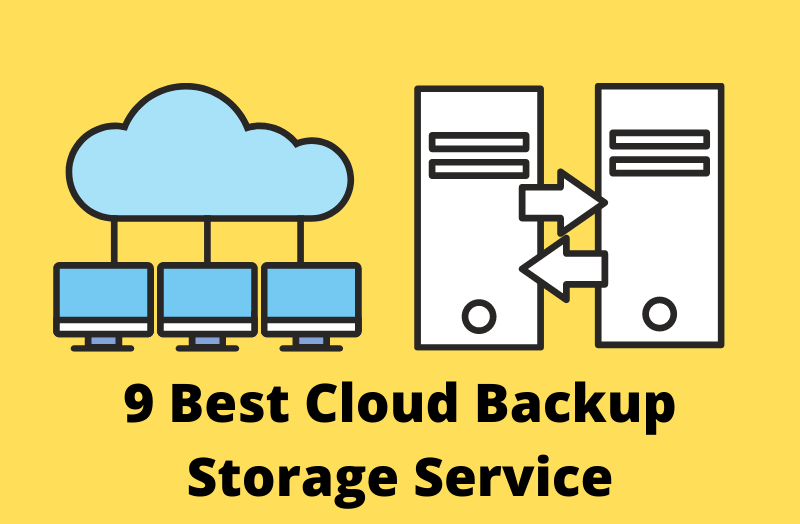We’ve investigated and reviewed all of the best cloud backup storage providers including functionality, security, cost and support among other things.
It’s not always easy to find the best cloud storage service. The market has grown and expanded so much in recent years that there is now a myriad of choices. Fortunately, whether you’re a complete novice or a seasoned technician, we’ve got you covered.
We explain what cloud storage is (and isn’t) in the following guide, as well as which service providers are the best – and why.
More cloud storage services have been tested and reviewed by us than anybody else online: over 50 providers, including cloud document storage and business cloud storage. Each platform has been thoroughly examined to determine which cloud storage service comes closest to perfection.
We look at a multitude of factors, including capacity, price, file size, security, the convenience of use, and more. If you’re still undecided about which cloud storage provider to go with, you may start by examining the security and privacy of your files and folders. Fortunately, our experts have compiled a list of our top selections for the best cloud storage services, which takes those factors into account.
When evaluating the pricing plans of any cloud service, make sure to read the fine print carefully because certain offers are only available for new clients. Additionally, like with all service providers, we strongly recommend that you use the 1-2-3 backup plan. Continue reading for an in-depth look at each cloud storage service, as well as much more.
If you still can’t find what you’re looking for, take a look at our other tips, such as the best cloud backup, best free cloud storage, and best photo storage.
Which cloud backup storage service is the best?
Look no further than IDrive if you’re looking for the greatest cloud storage solution overall. It offers a simple setup process, unlimited devices per account, and a free 5GB plan with a subscription version that costs only $3.98 for 10TB for the first year. Another significant advantage is its superb mobile app. Because so much modern work is done remotely or in a hybrid environment, any cloud storage platform must allow users to control their files from anywhere, including away from their desks. It also gives other services a run for their money in terms of speed and security.
Another service competing for the title of top cloud storage provider is pCloud. The pricing range is particularly enticing, as is the ability to create a family account and share storage space. Furthermore, the free account is amazing, with 10GB of storage and the same feature set as the commercial accounts. In the end, both IDrive and pCloud are excellent cloud storage options.
Best & Cheapest Cloud Backup Services: Best Most Secure Cloud storage
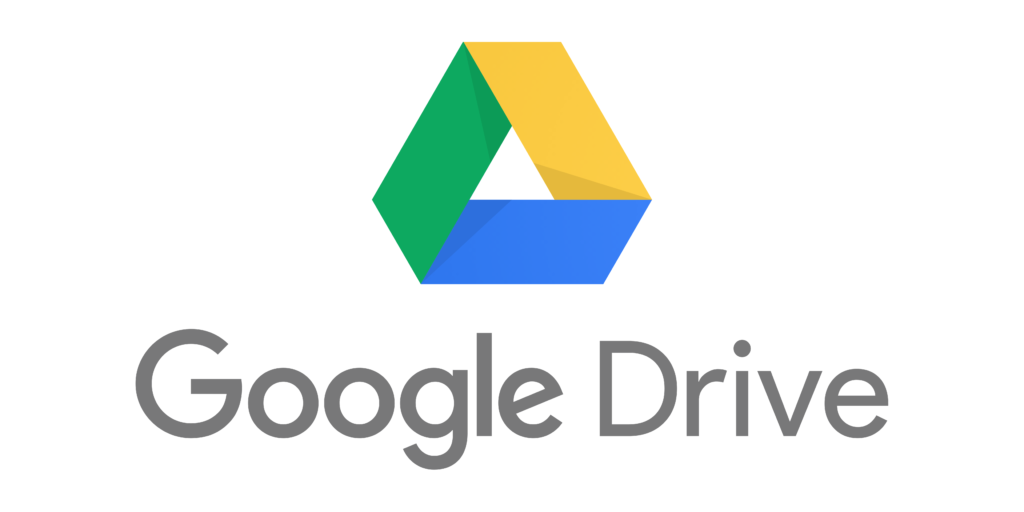
1. Google Drive Cloud Storage
Best free cloud storage for personal use, Small business & people who use Google Workspace and online photo storage.
SPECIFICATIONS
- Free tier: 15GB
- Storage capacity: 2TB
- Number of devices: Unlimited
Pros
- Generous amount of free storage
- Integrated with Android devices
Cons
- The web interface isn’t the best
Google Drive is a natural choice for Android users because it is already built-in, but users of other systems may benefit from the ample free storage.
You can also use Google’s office suite and keep unlimited high-definition photographs on your phone with the companion app Google Photos (Workspace). Individuals who upgrade to paid Google Drive plans will also become members of Google One.
Google Drive via One, which is linked to Google’s Cloud platform, offers a confusing assortment of capabilities that are always evolving. Google engineers were testing the ability to request approvals for Drive items and lock approved versions at the time of writing.
The 2TB tier, which costs $99.99 a year and includes 10% back in Google Store credits, allows the main account holder to join up to five other members.
The web interface isn’t particularly user-friendly, but Windows and Mac users may download desktop software to drag-and-drop files with ease. Google’s sophisticated AI and search technology, arguably the greatest in the world, is also integrated into Drive.
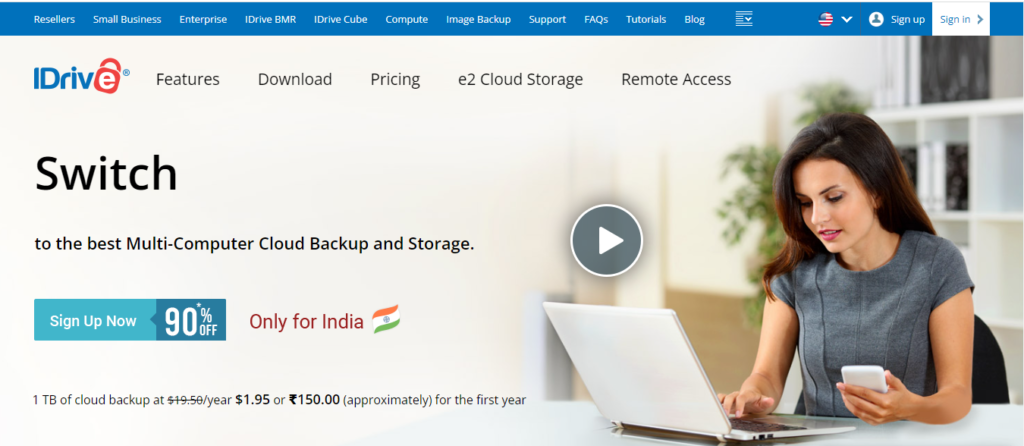
2. IDrive Cloud Storage
Because of its low price and large storage capacity, it is the best overall cloud storage option.
SPECIFICATIONS
- Free tier: 5GB
- Storage size: 10TB
- Number of devices: Unlimited
Pros
- Fast and capacious
- Easy to use
- Quasi-universal support for any device
Cons
- No small capacities are available
IDrive takes first place in our best cloud storage rankings thanks to its large amount of online storage, numerous security features, and low pricing.
Email, Facebook, and Twitter are all supported via the online interface for file sharing. Users who are cautious or click-happy may be relieved to learn that files removed from your computer are not automatically wiped from the server, reducing the risk of accidentally deleting something vital.
All files backed up to your account have up to 30 prior versions saved. IT admins also get access to the IDrive Thin Client application, which allows them to backup/restore, manage settings, and more for all of their linked machines from a single dashboard.
IDrive is a mobile backup app for iOS and Android devices that allows for cross-platform backup and recovery. If you lose all of your data, IDrive Express will send you a physical hard disk drive, allowing you to quickly restore all of your backed up files.
Priority support, single sign-on, unlimited users, and server backup are all available with IDrive Business. IDrive Personal provides up to 10TB of online storage per user, while IDrive for Business provides up to 50TB.
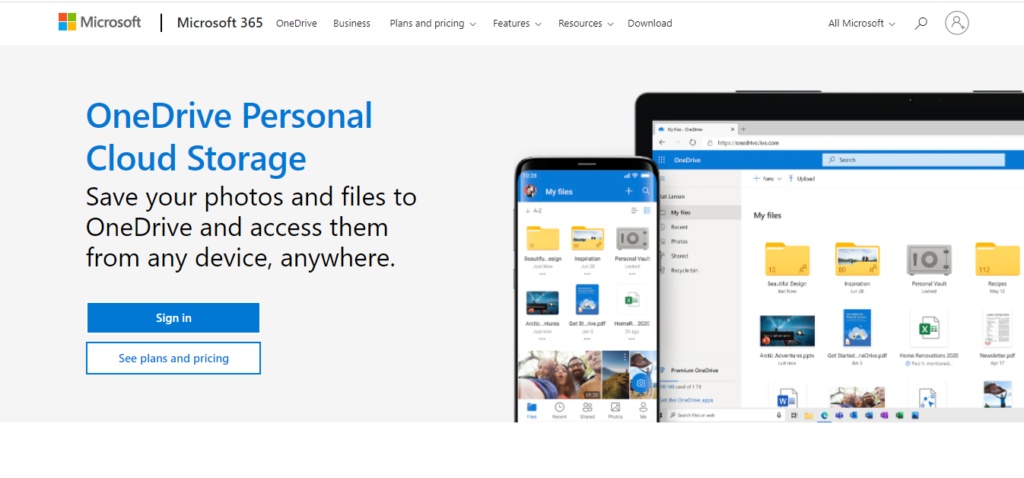
3. Microsoft OneDrive cloud storage
Best cloud storage for personal use, small business & those who have invested in Microsoft Office will benefit the most.
SPECIFICATIONS
- Free tier: 5GB
- Storage capacity: 6TB
- Number of devices: 30
Pros
- Comes with Microsoft 365
- Can edit files online without downloading them
Cons
- No advanced features
OneDrive will appeal to anyone who is dedicated to using Microsoft’s services, giving seamless integration with Outlook.com, the company’s popular email platform, for example, similar to how Google Drive appeals to Google customers.
OneDrive also works well with Windows 10 and Windows 11, and there are several useful mobile apps for access on the go. It also works with non-Microsoft services like AutoCAD, the design behemoth.
Even if they aren’t OneDrive subscribers, you can share files with them (with customisable permissions), and the option to modify files online without downloading them is a nice touch.
It’s a little frustrating that OneDrive doesn’t provide more free space, especially because Microsoft is a corporation with a lot of money to spend on the cloud. Free users are limited to 5GB of storage while upgrading to 100GB is reasonably inexpensive.
If you have Microsoft 365 (previously known as Office 365) through your employer, educational institution, or individual purchase, you’ll get 1TB of free storage per user with the option to upgrade. Keep in mind that this is secure cloud storage at its most basic level, with few sophisticated capabilities.
Dark mode and greater connection with Microsoft Teams are included in the Pro edition. Microsoft increased the OneDrive upload file size limit from 100GB to 250GB.
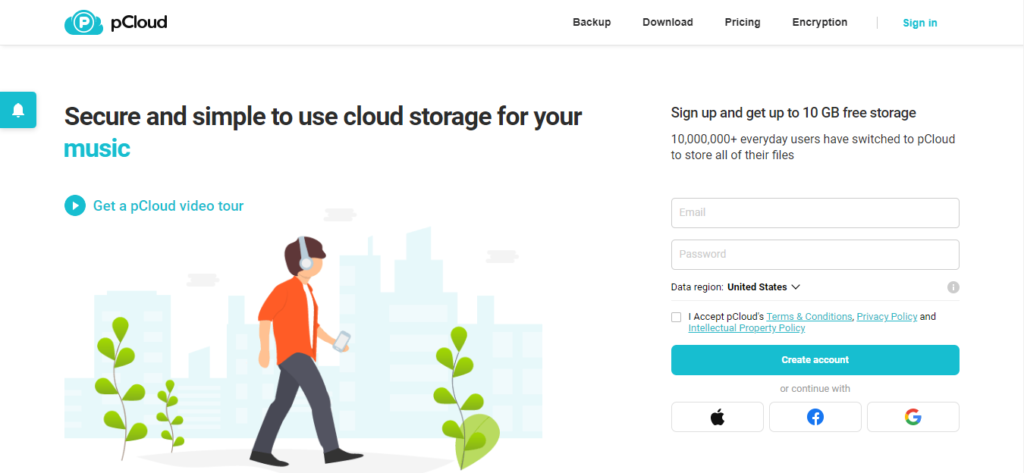
4. pCloud cloud storage
For people who don’t mind paying a one-time cost, this is the best cloud backup for small business.
SPECIFICATIONS
- Free tier: 10GB
- Storage size: 2TB
- Number of devices: 5
Pros
- Affordable
- Elegant, intuitive interface
- Simple to use
Cons
- No collaboration tools
This newcomer from Switzerland is vying for the title of finest cloud storage service. pCloud is one of the few cloud providers that offer lifetime subscriptions, thereby giving you a virtual, permanent cloud drive. It bills itself as a “personal cloud area where you can save all of your files and folders [with] a user-friendly interface that clearly shows where everything is and what it does.”
pCloud offers a 30-day trash history and unlimited remote upload traffic (you only need the file’s URL); however, download link traffic is limited to 500GB per month for the Premium package and 2TB for the Premium Plus package.
While there are some bandwidth restrictions, the size of files you can upload appears to be unrestricted, thus feel free to sync huge media files. The service works on both desktop and mobile platforms, and users may also log in through the website.
Users of pCloud can now choose whether their data is stored in the EU or the United States. The company is based in Switzerland, which has strict privacy rules, and you can pay an extra $4.99 per month for pCloud Crypto, which allows you to password-protect individual files.
There’s also a family option, which lets you share your space with up to four other family members, and a premium option, pCloud Business, which gives you 1TB per user and includes pCloud Crypto.

5. Icedrive cloud storage
Internal storage mirroring is the best solution.
SPECIFICATIONS
- Free tier: 10GB
- Storage capacity: 5TB
- Number of devices: Unlimited
Pros
- Top-notch security
- Easy-to-use interface
- Impressive value, particularly lifetime options
Cons
- Lacks any collaboration features
Although IceDrive has only been in the cloud storage business for a few years, the company offers a compelling offering that is distinct from the standard cloud locker.
The main distinction is that IceDrive’s online storage may be presented on your (Windows) machine as a regular drive, much like your hard drive, to make it easier and more intuitive to use. It’s simply like accessing a local drive, and you can utilize services like opening or editing files at nearly the same speed as a local operation as we saw in our assessment, there’s almost no noticeable lag.
Although there is a nifty program for other platforms – Windows, Mac, or Linux, as well as a web app – with a simplified and well-thought-out UI, this is a Windows-only function.
IceDrive uses super-safe Twofish encryption on its servers, with the data leaving your machine encrypted as well, to keep things further safer. IceDrive’s main flaw is that it lacks any of the collaboration capabilities and gimmicks that OneDrive, for example, offers.
IceDrive subscription tiers are reasonably priced, with the Lite tier, which provides 150GB of storage for $20 per year ($1.67 per month), being the most affordable. A Pro+ plan with 5TB of storage costs $15 per month, and lifetime plan options, which range from $99 to $599, could be excellent value.
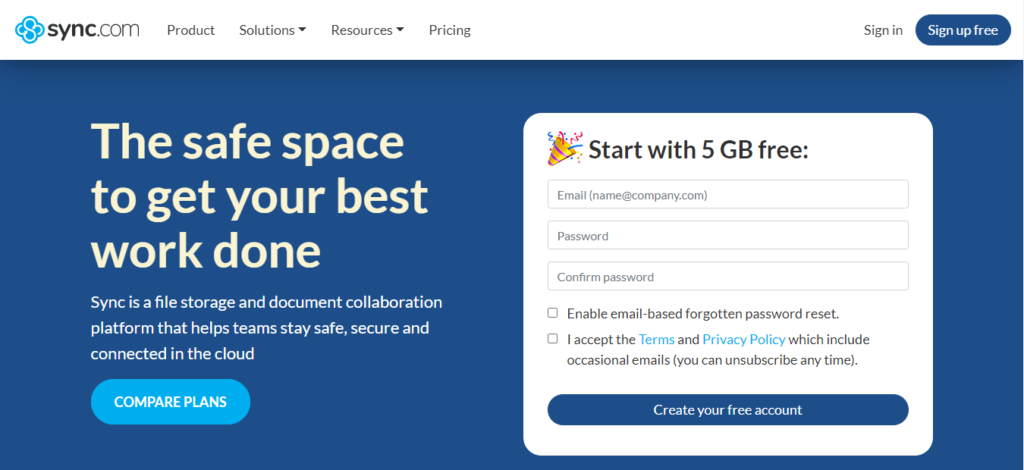
6. Sync cloud storage
Best for security right out of the box.
SPECIFICATIONS
- Free tier: 5GB
- Storage size: Unlimited
- Number of devices: Up to 5 active computers or mobile devices
Pros
- Strong security features
- Good for teams
- Simple access and setup
Cons
- Single-folder sync
- Basic interface options
Sync holds its own against some fierce competition in the cloud storage industry. Security is one of its strongest points, with end-to-end encryption available on all plans. And, as the name implies, syncing files across several devices and users is simple – you always maintain complete control over the files you share with others. Password protection and expiration dates for any links you send can help with this.
Versioning is also supported by Sync, so you can quickly roll back a file to a previous version. These older versions, impressively, do not count towards your storage limit. Furthermore, Sync comes with a mobile app that includes automatic video and photo uploads, making it great if you only want to make sure your smartphone photos are safe.
Sync may not have as many features as some of the other cloud storage services evaluated here, but it is one of its virtues in many ways. Sync concentrates on its primary service. It isn’t as refined as other cloud platforms, but it excels at what it does.
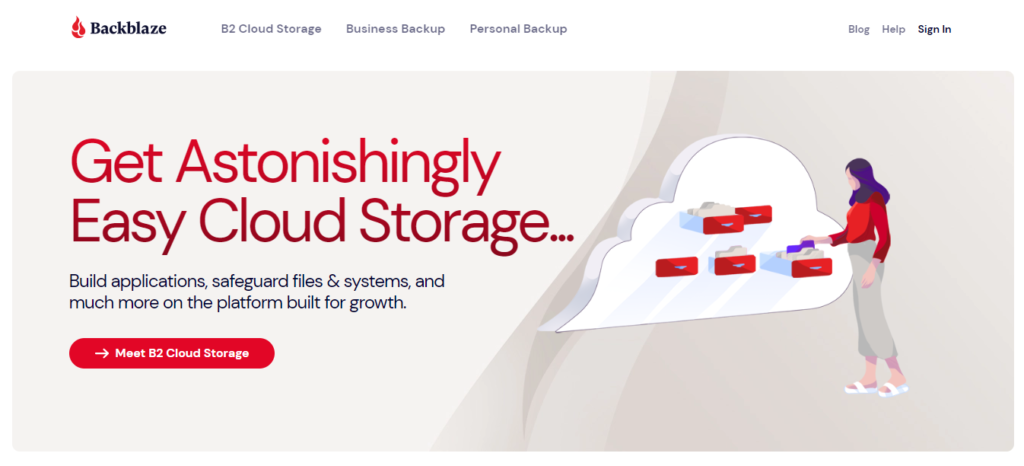
7. Backblaze cloud storage
Best for storage convenience made even better.
SPECIFICATIONS
- Free tier: N/A
- Storage size: Unlimited
- Number of devices: 1 (Personal Plan)
Pros
- Unlimited storage
- Fantastic value when purchased with ExpressVPN
- Dead easy to use
Cons
- No features beyond backups
- One PC per account only
Backblaze is a cloud storage behemoth and an industry veteran, catering to both personal and large-scale enterprise backup requirements. Backblaze’s watchword is “backup,” because there’s no file syncing or fancy collaborative capabilities here — it just backs things up, as the name implies.
It is the only service on this list that provides actual unlimited cloud storage with no restrictions. The monthly, annual, or two-year membership price for personal backups is reasonable ($60 for a year), especially considering the unlimited capacity.
But it gets even better when you learn that if you sign up for award-winning VPN provider ExpressVPN, you can receive Backblaze for free for a year.
Not only is ExpressVPN our #1 recommended service for protecting your online privacy, enhancing your anonymity, and allowing you to geo-spoof your location, but you also get 15 months for the price of 12 – plus a free year of Backblaze!
Backblaze, on the other hand, is a fairly enticing prospect on several fronts if all you need is a backup solution. For starters, Backblaze makes the process of backing up and securing your files extremely simple; even effortless.
Simply install the software, and it will automatically back up all vital data (basically anything that isn’t a system file or equivalent) without requiring any human intervention. You can simply forget it’s there and not worry about your files.
The catch is that one account only covers one computer, so while there are no data limits, you’ll need to pay for a new subscription for any computer you want to back up.
Your data is encrypted for security, and you can have a physical hard drive or flash drive sent over for a cost if a restoration process is required.
Backblaze is a terrific service for individuals who only need a simple backup solution with no extra features or trimmings, and it’s a great value given the unlimited data support. A 15-day free trial (no credit card information required) is also available to try before you buy.
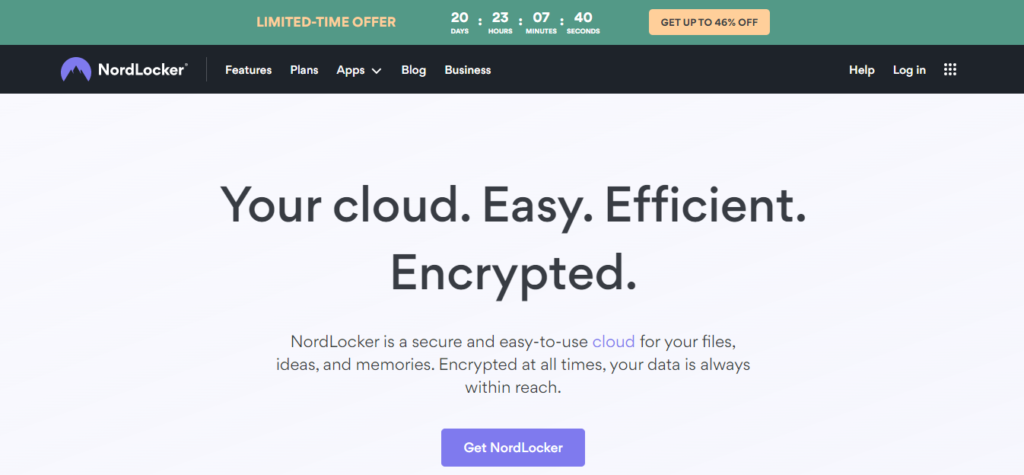
8. NordLocker cloud storage
The best balance of security and usability.
SPECIFICATIONS
- Free tier: 3GB
- Storage capacity: 500GB
- Number of devices: Unlimited
Pros
- Slick and user-friendly app
- Good on the security front
- ‘Zero knowledge’ policy
Cons
- You only get 3GB with the free product
- NordLocker app required for file sharing participants
NordLocker may sound familiar, owing to its origins with NordVPN, one of our top VPN providers. It’s a simple but efficient tool that gives you a cloud storage locker or can be used to establish a local file vault on your device for secure storage, all while securing your data with encryption.
NordLocker lets you sync all of your data in the cloud across all of your devices, and it’s a snap to use — simply drag and drop your files into the app, and they’ll be immediately encrypted and uploaded. Sharing files with others is possible, but they must also have a NordLocker account and be using the program.
As you might assume, NordLocker’s security is top-notch, featuring Argon2, AES256, and ECC encryption algorithms, as well as a ‘zero knowledge’ policy that means your data can only be decrypted by you (and not the company, even if it wanted to).
NordLocker may not provide enough capabilities for specialists or more demanding customers, but it’s a strong, user-friendly basic solution that, if that’s all you need, is a solid value offer.
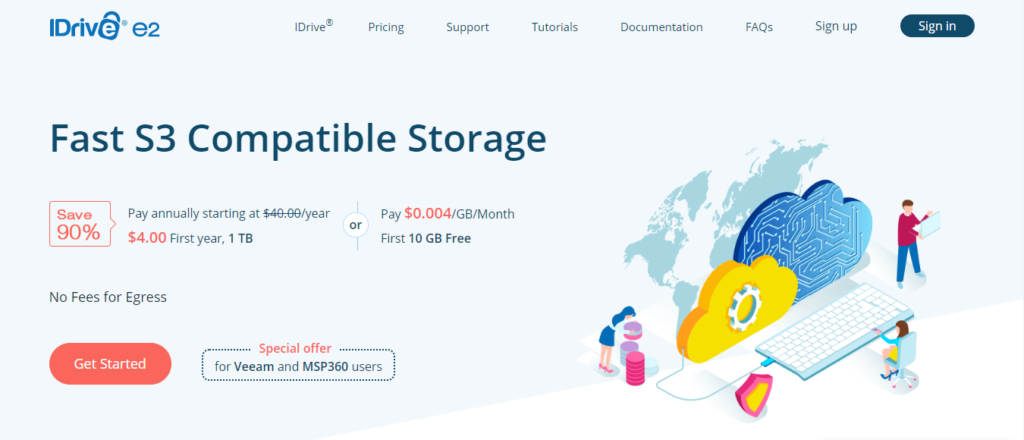
9. IDrive e2 cloud storage
Provisioning of S3 cloud storage.
Pros
- Multiple modes of support are available
- Value pricing
- Multiplatform support
- 99.9% server uptime
Cons
- Direct support hours are IST
- Lack of support for IaaS
- No hosting of static websites
IDrive e2 is an S3 compliant cloud storage offering with dedicated software for Windows and Mac that can be used on a range of platforms. Mobile apps are also available for both iOS and Android.
The idea is to use IDrive e2 as a destination for data from many devices, allowing users to backup data from smartphones, PCs, tablets, and even hard drives to a single cloud account. Files and folders can then be synced across several devices in real-time.
If you require a physical duplicate of the data, IDrive e2 has you covered. In less than a week, IDrive Express can send tangible disks containing your data.
Overall, IDrive e2 is a compelling upgrade for those looking to move beyond more typical cloud storage solutions. We enjoy the low cost of data storage, which includes the first 10 GB for free, the multiplatform support with smartphone apps, and the numerous support options.
What to Think About When Choosing Cloud Storage?
With so many cloud storage providers on the market today, from big giants like Google to smaller, more niche players, finding the appropriate one for you can be difficult. One of the first things you’ll want to think about is the price. While the initial investment in cloud storage is typically modest (or non-existent), the ongoing costs can build up quickly when you factor in extra storage needs and premium capabilities. Make sure you read your cloud contract thoroughly to avoid receiving an unexpectedly huge payment.
Service and security standards credentials are also crucial. Look for a cloud storage provider with certifications that guarantee a consistent service level agreement (SLA) and data security. Also, be sure your storage provider has the scalability you’ll need as your business grows, as well as a flexible pricing approach to match. When it comes to choosing a cloud storage service, shopping around may be the best option. There’s certain to be a solution that meets your requirements, but don’t just pick the first cloud provider you come across.
How did we evaluate the best cloud backup storage services?
When we evaluate a cloud storage service, we look at file transfer upload and download speeds, but this is only a small part of the final grade because numerous other factors affect your download or upload speeds that are difficult to avoid (contention rate, time of day, server load etc).
The pricing is something else you should think about. While the initial investment in cloud storage is typically modest (or non-existent), the ongoing costs can build up quickly when you factor in extra storage needs and premium capabilities. Make sure you read your cloud contract thoroughly to avoid receiving an unexpectedly huge payment.
Service credentials and security standards are also important. Look for a cloud storage provider with certifications that guarantee a consistent service level agreement (SLA) and data security. Also, be sure your storage provider has the scalability you’ll need as your business grows, as well as a flexible pricing approach to match.
Last but not least, a cloud storage service’s quality of customer assistance, whether it’s available 24/7 over the phone or only over the web. Our reviews cover all of this, as well as usability and platform compatibility, and compare each cloud storage service to similar competitors in terms of key features and pricing, so you can make an informed decision based on as much information as possible when it comes time to choose the best cloud storage provider for you.
So, what exactly is cloud storage?
To comprehend what cloud storage entails, you must first comprehend what the cloud is. In a nutshell, it’s a resource (typically computer power or storage) that you may get online for free or for a price.
It’s a safe virtual place that you often access using your browser or a desktop program (or mobile app).
Consider it similar to self-storage services, which are popular among house movers and renters, except instead of boxes, you fill cloud storage accounts with your files.
Many users commonly refer to cloud backup, online storage, online drives, online backup, file hosting, file storage, and other services that fall under the umbrella term (cloud storage).
In the cloud, where is data stored?
Your files are most likely stored in a data centre, on a server, or a hard drive or solid-state drive. However, some services, employing technology similar to bit-torrent, allow you to save files on tape drives and even on other people’s computers.
What is the process of cloud storage?
The concept of cloud storage has been around for a long time, believe it or not. The concept was popularized by Amazon’s S3 (Simple Storage Service) in 2006, however, the ability to upload and store files remotely on a service provider’s disk drive can be traced back to Compuserve’s offer in 1983.
At the end of the day, you’re simply storing your data on someone else’s resources (a portion of a hard disk, a solid-state drive, or even tape).
That resource is usually (but not always) kept on a server in a data centre, among hundreds of others. The procedure is carried out via a dedicated app or a web browser via a secure internet connection.
Almost everyone with a smartphone or an email address has some form of cloud storage account. Facebook might potentially offer a restricted version of cloud storage to its users, with movies and photographs being uploaded to its servers for free. Also check out: Best Website Builder Services
